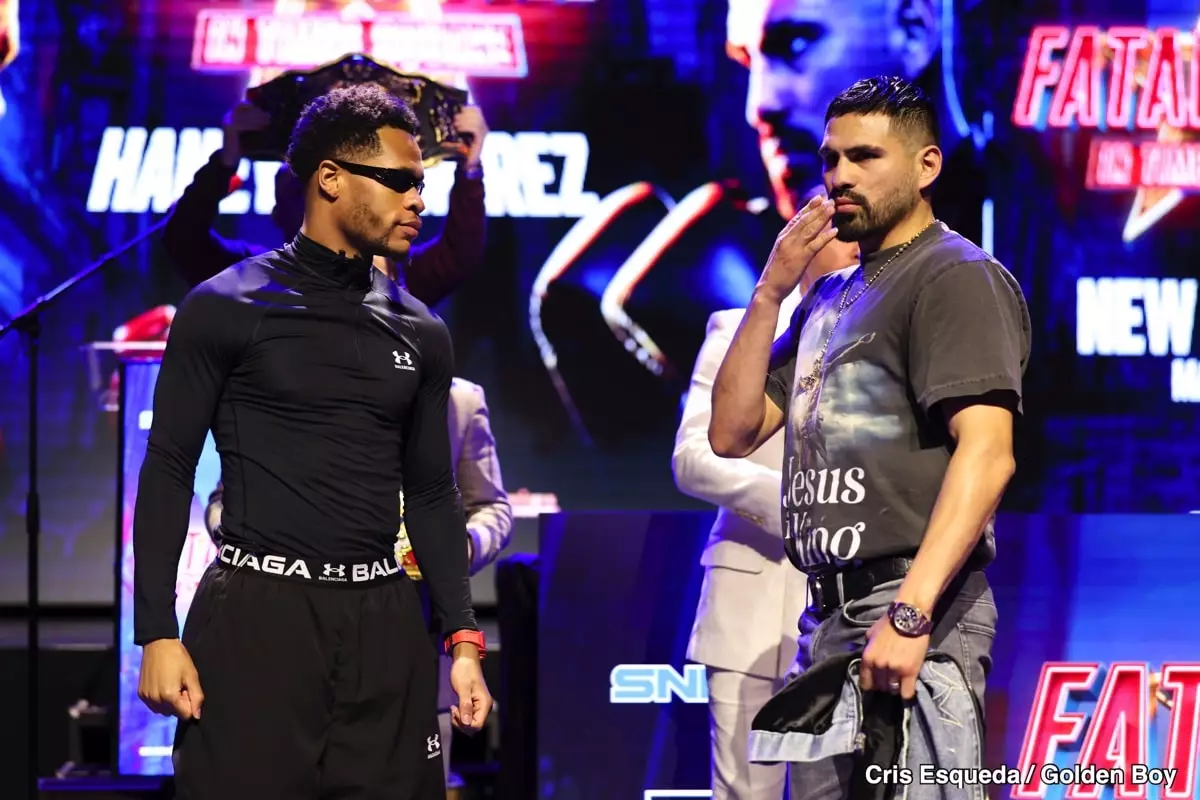In the competitive landscape of professional boxing, the stakes are always high, especially for fighters looking to reclaim their status after setbacks. Devin Haney, a skilled but polarizing figure in the ring, is facing scrutiny as he prepares for his comeback, taking on former champion Jose Ramirez on May 2nd in Times Square, New York. This choice, however, is being labeled as a miscalculation by some, including fellow boxer Gabe Rosado, who believes Haney may be stepping into the ring with a formidable opponent at the wrong time.
The backdrop to this bout features Haney’s recent loss to Ryan Garcia—a defeat that not only stung his career but also served as a long layoff from the sport. Coming back after such a significant break can be a tricky endeavor, particularly when opting for an opponent as dangerous as Ramirez. Rosado’s perspective highlights an essential aspect of boxing: the blend of strategy, timing, and risk. Being judicious in the selection of opponents is crucial, and Rosado’s criticism suggests that the decision to fight Ramirez may be fraught with danger.
Ramirez: More than Meets the Eye
Jose Ramirez may have experienced a recent defeat to Arnold Barboza Jr., but this does not paint a complete picture of his capabilities. Ramirez is not just a name; he carries with him the weight of experience and a reputation as a former WBC and WBO light welterweight champion. His knockout power—evident from his 18 KOs—places him in a category that can easily challenge even the most skilled opponents, particularly those returning from an extended hiatus.
While there may be a perception that Ramirez is vulnerable due to his past losses, it is crucial to analyze these setbacks closely. Rosado recognizes that Ramirez’s defeat was narrow and comes against a rising star in Barboza Jr. The close nature of that fight indicates that Ramirez remains a serious threat, revealing the fallacy in dismissing him as a mere stepping stone for Haney. The boxing world knows that talent can often be concealed behind records; an opponent’s resume is not always an accurate indicator of their current form, especially in a sport characterized by its unpredictability.
Judging Haney’s Decision-Making
The choice to face such a tough opponent right off the bat after a year away raises critical questions about Haney’s judgment and readiness. Gabe Rosado has voiced a concern shared by many: that bringing in Ramirez as a comeback opponent is not just presumptuous but potentially detrimental. The discrepancy between skill levels, demonstrated experience, and psychological resilience becomes crucial here. Will Haney, coming off a loss, have the mental fortitude to face a relentless competitor like Ramirez?
Rosado expresses that his critique isn’t predicated on a desire for Haney to fail but stems from genuine concern for the fighter’s career trajectory. This reflection speaks volumes about the supportive yet competitive nature of the boxing community, where opinions are often vocalized not out of animosity but out of a deep understanding of the sport’s complexities. The psychological aspect of fighting—especially following a defeat—cannot be underestimated.
The Implications of a Misstep
For Haney, the risk of selecting Ramirez as his comeback opponent could result in significant career implications. Should he falter against Ramirez, the consequences may extend beyond just losing; it could alter his image in the boxing hierarchy and influence future match negotiations and public perception. This added layer of pressure is exacerbated by the fact that fighters can be quick to judge, especially in a sport that thrives on narratives of triumph and failure.
Additionally, the rivalry with Ryan Garcia remains fresh in the narrative, and the recent troubles surrounding Haney in relation to Garcia only serve as another complication. Fans and analysts alike are keenly observing how Haney handles the pressure following his loss. It becomes more than just a fight; it’s about demonstrating resilience and the ability to bounce back in a sport where reputation can shift with the outcome of a single bout.
In the end, the upcoming match against Ramirez offers an intersection of risk and opportunity for Haney. It underscores the critical importance of thinking strategically in the fiercely competitive world of boxing, particularly when navigating the tumultuous waters of comeback situations.

